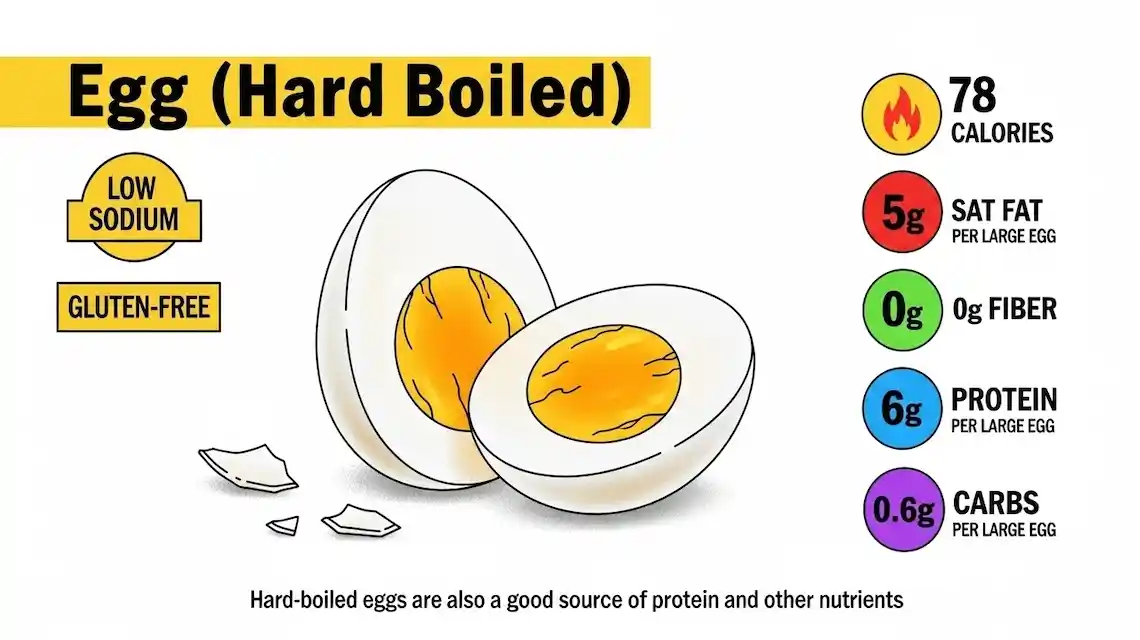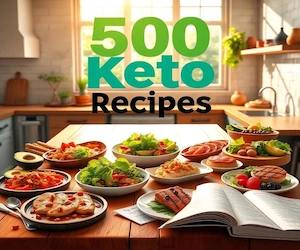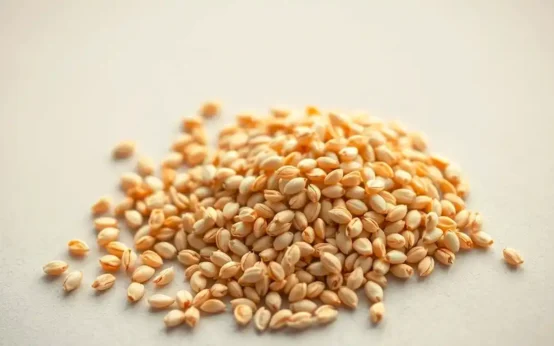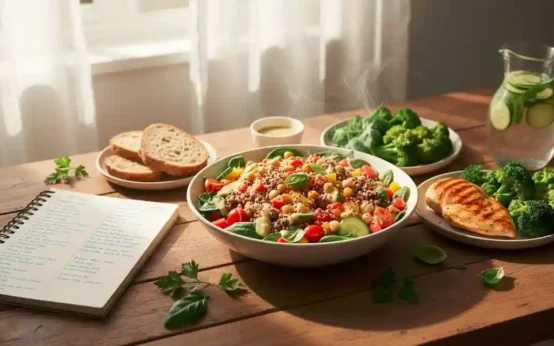Boiled eggs are the kind of snack that checks every box. They are quick, portable, filling, and great for weight management because they pair high-quality protein with steady energy. If you are wondering how many calories in a boiled egg, the short answer is simple. A large boiled egg has about 78 calories.
Knowing this number helps you track your day without guesswork. It makes meal planning cleaner, supports fat loss or muscle goals, and keeps snacks honest. You get solid nutrition for very few calories, which is why boiled eggs show up in lunchboxes, salads, and post-workout plates.
They are simple, nutritious, and versatile. Eat them with fruit, on toast, or sliced over greens. Keep a batch in the fridge and you have built-in portion control. No oil, no extra steps, just consistent results you can count on.
In this post, you will get a clear calorie breakdown by egg size, plus the difference between the yolk and the white. You will see how boiled compares with other cooking methods, how to fit eggs into your macros, and smart serving ideas. By the end, you will know exactly how to use boiled eggs to hit your daily targets without overthinking it.
How Many Calories Are in a Boiled Egg?
If you want a quick answer for how many calories in a boiled egg, size is what matters most. Using standard USDA figures, a large boiled egg has about 78 calories. Medium is lower, extra-large is higher. The white carries few calories, while the yolk holds most of the energy.
Calories by Egg Size
Use this quick chart for tracking. It matches typical USDA values.
| Egg Size | Calories (boiled) |
|---|---|
| Small | 54 |
| Medium | 68 |
| Large | 78 |
| Extra-large | 90 |
Yolk vs white for a large egg:
- Whole: 78 calories
- White only: 17 calories
- Yolk only: 61 calories
For cooking, check the carton for size, then log per egg. If you separate parts, count whites and yolks on their own. For tighter control, weigh peeled eggs and use size-based estimates. Small variations happen with brand, freshness, and actual egg weight, but these numbers keep you accurate enough for meal prep. Dieters who track to the calorie can use whites to trim energy while keeping protein high. Want a simple rule? Large egg equals 78, or pair one yolk with two whites for a lean, satisfying mix.
Does Boiling Change the Calories?
Boiling does not add calories, since you are not using oil or butter. A boiled egg has the same calories as a raw egg of the same size. Hard-boiled and soft-boiled are also the same, because the heat only changes texture. Any water loss during cooking is small and does not meaningfully change energy content. Compare that to frying, where fat in the pan adds calories fast. If you want a low-cal, high-protein option, boiled eggs are a reliable pick for breakfast, snacks, and salads without surprise calories.
Nutritional Benefits of Boiled Eggs Beyond Calories
There is more to a boiled egg than its tidy calorie count. Along with the 78 calories in a large egg, you get high-quality protein, healthy fats, and key vitamins and minerals that support performance, recovery, and overall health. For anyone tracking how many calories in a boiled egg, this is the rest of the story that makes it a smart daily pick.
Protein Power for Your Workouts
A large boiled egg delivers about 6 grams of complete protein. That means all nine essential amino acids, including leucine, which supports muscle protein synthesis. This helps you repair tissue after training and maintain lean mass during a cut.
Protein also helps you stay full. Eggs score high on satiety, which can curb snacking and make a calorie deficit easier to manage. Since eggs are very low in carbs and contain a small amount of fat, they fit cleanly into most training plans, from low carb to balanced macros.
Try these simple ideas to get more from your egg:
- Post-workout bite: Two eggs with a piece of fruit for fast and slow fuel.
- Balanced snack: Eggs with crunchy veggies, like bell pepper, cherry tomatoes, or cucumber.
- Meal boost: Add sliced eggs to a salad for an easy protein upgrade.
Aim for 20 to 40 grams of protein per meal. Eggs can anchor a snack or stack with Greek yogurt, tuna, or legumes to hit your target without extra effort.
Vitamins and Minerals That Boost Health
Boiled eggs pack helpful micronutrients that support brain, eye, and metabolic health.
- Choline: Supports brain and nervous system function. One large egg offers about 25 to 30 percent of daily needs, which is hard to get from most foods.
- Lutein and zeaxanthin: Antioxidants that support eye health. These concentrate in the yolk and help protect against screen strain and age-related changes.
- Riboflavin (B2): Helps convert food to energy. One egg gives roughly 15 percent of the Daily Value.
- Vitamin B12: Supports red blood cells and nerve health. About 20 percent of the Daily Value per egg.
- Vitamin D: Small but meaningful amount, helpful for bones and immune health.
- Selenium: Antioxidant mineral, about 25 to 30 percent of the Daily Value.
About cholesterol: one large egg has around 186 milligrams. For most people, dietary cholesterol affects blood levels less than saturated fat does. If you have diabetes or heart disease, follow your provider’s guidance. Eggs can still fit into a heart-smart plan when paired with fiber-rich foods and plenty of plants.
How to Use Boiled Eggs in Your Daily Diet
Boiled eggs fit almost any meal plan and make tracking easy, especially when you care about how many calories in a boiled egg. Keep a batch in the fridge and build simple plates that hit your goals without fuss. Pair eggs with fiber and volume foods so you feel full with fewer calories.
Try these smart ways to use them all week:
- Breakfast bowls: mix eggs with sautéed spinach, cherry tomatoes, and a little feta.
- Salad toppers: slice over greens, beans, and a light vinaigrette.
- Snack boxes: pack two eggs, crunchy veggies, and a small fruit.
- Lighter egg salad: mash eggs with plain Greek yogurt, mustard, dill, and celery.
- Healthy deviled eggs: use Greek yogurt instead of mayo, add paprika and chives.
Portion control helps. Use one egg with extra veggies, or go one yolk with two whites when you need a leaner plate. Allergic to eggs or plant-based? Try tofu scramble, chickpea “egg” salad, or hummus with veggies for a similar protein-plus-fiber effect.
Quick Recipe Ideas Low in Calories
Simple builds you can prep in minutes. Keep portions tight for under 150 calories per serving.
- Avocado Egg Boats (mini)
- Ingredients: 1 hard-boiled egg, 1 small avocado, lemon, salt, pepper.
- Steps:
- Scoop 1 quarter of the avocado into a small bowl.
- Mash with lemon, salt, and pepper.
- Top with half a chopped egg. Serve on cucumber rounds.
- About 140 calories per serving.
- Spinach Egg Wrap
- Ingredients: 1 hard-boiled egg, 1 low-cal tortilla (50 to 70 calories), 1 cup fresh spinach, mustard.
- Steps:
- Layer spinach on the tortilla.
- Slice the egg and add on top.
- Drizzle mustard, roll, and slice.
- About 130 to 150 calories.
- Zesty Yogurt Egg Salad Cup
- Ingredients: 1 hard-boiled egg, 1 tablespoon plain Greek yogurt, celery, dill, lemon.
- Steps:
- Chop egg and celery.
- Mix with yogurt, dill, and lemon.
- Spoon into a romaine leaf or mini bell pepper.
- About 120 to 140 calories.
Conclusion
Boiled eggs keep things simple and effective. A small to extra-large egg lands between about 50 and 90 calories, with most energy in the yolk and lean protein in the white. That clarity makes tracking easy when you care about how many calories in a boiled egg.
You also get quality protein, choline, B vitamins, and antioxidants that support training, focus, and long-term health. Add them to salads, wraps, snack boxes, or a quick post-workout plate for steady energy without extra calories. Keep a batch in the fridge so meals feel automatic and portion control stays tight.
Put this into action today. Pick a size, log it, and try one of the quick recipes above or pair an egg with fruit and crunchy veggies. If you are cutting, go one yolk with two whites for a lighter mix. If you are building, stack two eggs with a carb source to support recovery. Small habit, big payoff, especially when the numbers are clear and the nutrition works for your goals.
Related post: Easy Make Oatmeal Cookies
Boiled Egg Calories: FAQ
How many calories are in a large hard-boiled egg?
About 78 calories for one large hard-boiled egg.
Do soft-boiled and hard-boiled eggs have the same calories?
Yes. Cooking time changes texture, not calories.
How many calories are in different egg sizes?
- Small: about 55 to 60 calories
- Medium: about 65 calories
- Large: about 70 to 80 calories (most lists use 78)
- Extra-large: about 80 to 90 calories
- Jumbo: about 90 to 100 calories
How many calories are in just the egg white?
About 17 calories for the white from a large egg.
How many calories are in just the yolk?
About 55 to 60 calories for the yolk from a large egg.
Do eggs lose or gain calories when boiled?
No. Boiling does not change the calorie count. Water loss is minor, so the difference is trivial.
How many calories are in two or three boiled eggs?
Two large boiled eggs, about 156 calories. Three, about 234 calories.
Do brown eggs have more calories than white eggs?
No. Shell color does not affect calories or nutrition.
What adds calories to a boiled egg?
Salt and pepper add almost none. Mayo adds about 90 calories per tablespoon. Butter adds about 100 per tablespoon. Olive oil adds about 119 per tablespoon.
What are the macros in a large boiled egg?
About 6 grams protein, 5 grams fat, less than 1 gram carbs. Around 186 mg cholesterol.
Are boiled eggs good for weight loss?
Often, yes. They are high in protein, filling, and about 70 to 80 calories each. Pair with veggies or whole grains for a balanced meal.
Does overcooking change the calories?
No. You might see a green ring around the yolk, but the calories stay the same.




 Health Benefit of Sesame Seed
Health Benefit of Sesame Seed  Healthiest Breakfast Cereal for Children
Healthiest Breakfast Cereal for Children  Vegan Oil Free Mayonnaise Recipe
Vegan Oil Free Mayonnaise Recipe  Nutrition to Enhance Athletic Performance
Nutrition to Enhance Athletic Performance  Tasty Healthy Low Cost Meals Recipes
Tasty Healthy Low Cost Meals Recipes  Gluten Free Food Options
Gluten Free Food Options